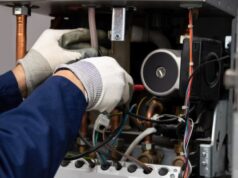
The wrong hot water system can easily account for the lion’s share of your electricity consumption. In fact, electric tank systems are being phased out. Find out how different systems compare in terms of efficiency.
Some energy efficient hot water systems can be directly compared to others of the same fuel type thanks to the government-backed ratings standard (in particular, MEPS and gas star ratings).
These ratings aren’t quite as useful for comparing between different fuel types though. For example, gas and electricity star ratings cannot be compared on an apples-to-apples basis.
How is the electricity generated?
As far as emissions are concerned, it’s also important to consider how your electricity’s generated in the first place. If you live in Victoria, for example, the power you get off the grid’s likely to have been generated using brown coal – which is responsible for very significant amounts of greenhouse gas emissions. By contrast, if you live in Hobart most of your power probably comes from clean, renewable hydro power.
Signing up for GreenPower or generating your own electricity using solar panels or a wind generator will also reduce emissions. If your electricity comes from renewable sources then an electric tank, booster or heat pump system may well be a very clean option – but for the purpose of this list, we’ll assume that we’re talking about grid power generated using fuels like coal (which accounts for the bulk of Australia’s electricty).
Which systems are most efficient?
To break it down, here’s an easy to follow guide, ranking the available fuel types from most efficient to least.

1. Solar boosted
The most efficient systems available, solar boosted systems are generally boosted by either gas or electricity, but get most of their energy from the sun. Bear in mind that if boosted by electricity from non-renewable sources, this may rank the system below natural gas but above heat pumps in terms of operating costs and emissions.

2. Natural gas/LPG
Continuous flow gas hot water systems rated at 5 stars or above are the next best option to solar. Tank systems may be a more efficient option for households with four or more people. LPG is roughly on par with natural gas in terms of environmental impact, although it costs more.

3. Heat pump
Heat pump technology ranks above electric storage in terms of efficiency, but it still uses electricity and makes a higher contribution to greenhouse gas emissions than gas in most cases. If gas or solar aren’t viable where you live, this is the more efficient alternative. Geothermal systems also use similar technology.

4. Electric
Electric tank systems running on electricity from non-renewable sources are inefficient. Each one in Australia puts out, on average, over four tonnes of greenhouse gas per year. These systems are currently the target of a federal phase-out. If you’re replacing one of these systems and you don’t have solar power, consider other options to see if you could save money and the environment. If you don’t have a gas supply and need to use electricity, a heat pump system is likely to be more efficient. Continuous flow electric systems are slightly more efficient too, but they’re uncommon because they’re expensive to run – and they usually require three phase power too (which also comes with additional costs if you don’t already have it).





